小学英语320介词inonat用法
inonat的时间用法和地点用法完全版
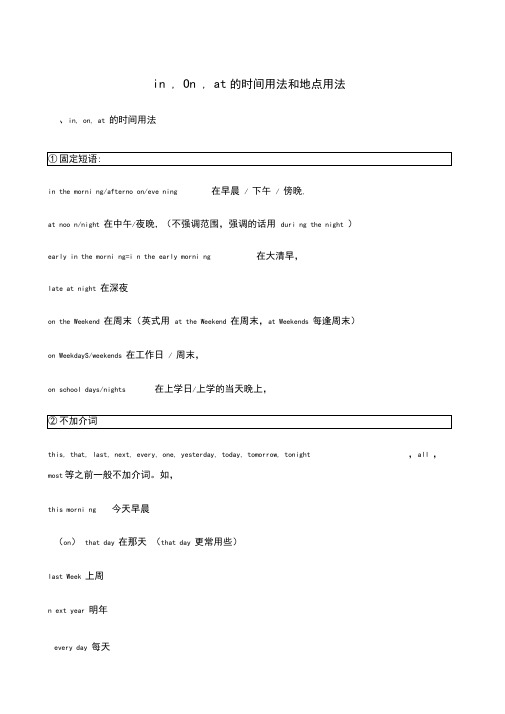
in , On , at的时间用法和地点用法、in, on, at 的时间用法in the morni ng/afterno on/eve ning 在早晨/ 下午/ 傍晚,at noo n/night 在中午/夜晚,(不强调范围,强调的话用duri ng the night )early in the morni ng=i n the early morni ng 在大清早,late at night 在深夜on the Weekend 在周末(英式用at the Weekend 在周末,at Weekends 每逢周末)on WeekdayS/weekends 在工作日/ 周末,on school days/nights 在上学日/上学的当天晚上,this, that, last, next, every, one, yesterday, today, tomorrow, tonight ,all ,most等之前一般不加介词。
如,this morni ng 今天早晨(on)that day 在那天(that day 更常用些)last Week 上周n ext year 明年每天the next mon th第二个月(以过去为起点的第二个月,next mon th以现在为起点的下个月)One morni ng —天早晨yesterday after noon 昨天下午tomorrow morning 明天早晨all day/mOrning∕night整天/ 整个早晨/ 整晚(等于the whole day/mOrning∕night)most of the time (在)大多数时间除了前两点特殊用法之外,其他≤一天,用on ,>—天用in ,在具体时刻或在某时用at(不强调时间范围)关于on生日、on my ninth birthday 在我九岁生日那天节日、on TeaCherS ' Day在教师节(注意:节日里有表人的词汇先复数再加S '所有格,如on ChiIdren ' S Day, on WOmen S Day, on TeaCherS ' Day 有四个节日强调单数之意思,on MOther ' S Day, on Father ' S Day, on April Fool ' S Day, on Valentine ' S Day)星期、on Sunday 在周日,on Sunday morning 在周日早晨on the last Friday of each month 在每个月的最后一个星期五日期、OnJune 2 nd在六月二日on the seco nd (of June 2 nd)在六月的第二天即在六月二日on the morning of June 2 nd在六月二日的早晨,on a rainy morning 在一个多雨的早晨on a Certa in day 在某天On the SeCO nd day 在第二天(以过去某天为参照)注意:On Sunday在周日,On Sundays每逢周日(用复数表每逢之意),every Sunday每个周日,基本一个意思。
in on at的用法

in on at的用法
很多英语学习者往往会发现,介词in、on、at有着非常相似的用法,使他们混淆不清。
实际上,他们之间也有区别,有各自不同的用法需要掌握。
首先,in一般用来表示方位、动作或状态的发生在空间,时间,抽象概念的“里面”或“中间”。
例如:
I in the garden.(我在花园里。
)
He is in a bad mood today.(他今天心情不好。
)
She was born in 1985.(她出生于1985年。
)
其次,on表示两个实体之间的关系,如表面上的接触,行为或状态发生的位置。
例如:
The book is on the desk.(书在桌子上。
)
The meeting will be on Wednesday.(会议将于周三举行。
)
He was on the phone when I arrived.(我到达时他在打电话。
)最后,at表示一个特定的时间、点、地点、距离或活动。
例如:
I will be at home at 7 oclock.(我7点将回家。
)
She was waiting at the bus stop.(她在公交车站等候。
)
We had a party at my house.(我们在我家举行了一个派对。
)总结起来,in表示动作或状态发生在某个空间里,on表示表面
上的接触,而at表示时间或地点。
这些介词都是口语中非常常见的,如果能掌握他们的用法,会有助于你能正确使用他们,来表达你想要说的句子。
英语介词inonat等的用法大全

英语介词in、on、at等的用法大全“”,今天接着跟大家分享这三个介词表时间的用法。
一、at1、表示时刻,即几点几分(with particular points on the clock)I’ll see you?at five o’clock. (我五点和你见面。
)2、表示一天中的某个时间段(with particular points in the day)The helicopter took off?at midday?and headed for the island. (直升机中午起飞,飞往那个岛屿。
)3、表示一周中的某个时间段,即工作日(weekday)和周末(weekend)(with particular points in the week)What are you doing?at the weekend?4、表示某种特殊场合,如名字中不含day的节假日(with special celebrations)At the New Year, millions of people travel home to be with their families (到了新年,成百上千万的人会回到家里和家人团聚。
)例外情况:如果是说在生日那天,不用at,而用on,因为生日那天是指具体日期,请往下参考on的用法。
【注意】如果是用what time来提问,what time前面一般不用at。
如:What time are you leaving? (你几点走?)但是在口语中也可以这么问:At what time are you leaving?二、on1、用在日期前(with dates)We moved into this house?on 2 October 1997. (我们是1997年10月2日搬进这栋房子的。
)2、用在星期的单数前(with a singular day of the week to refer to one occasion)I’ve got to go to London?on Friday. (我周五就到伦敦了。
介词 in on at 的区别

all的词组和tomorrow,yesterday, the day after tomorrow, the day before
yesterday 前不用任何介词。例如:
What did you do last summer holidays?去年暑假你做了些什么?
What are you going to do the day after tomorrow?后天你打算做什么?
(4)表示“在某年代或特定世纪某年代”时,须用介词in。例如:
This incident happened in the 1970''''s.该事件发生在20世纪70年代。
The Anti-Japanese War broke out in the 1930''''s.抗日战争爆发于20世纪30年代。
What do you often do at noon?你中午经常做些什么?
You can see many stars in the sky at night.夜晚你能看到天空中有许多星星。
(4)表示“在……岁”时,须用介词at。例如:
At the age of nine ,the boy could swim
well.在九岁的时候,这孩子就游泳游得很好了。
At the age of twenty,I began to teach English at this
school.在二十岁的时候,我就开始在这所学校教英语了。
注意:在含有next ,last,this,one ,any, each, every , some,
(3)表示“在某世纪”时,须用介词in.例如:
inonat的时间用法和地点用法史上最全版
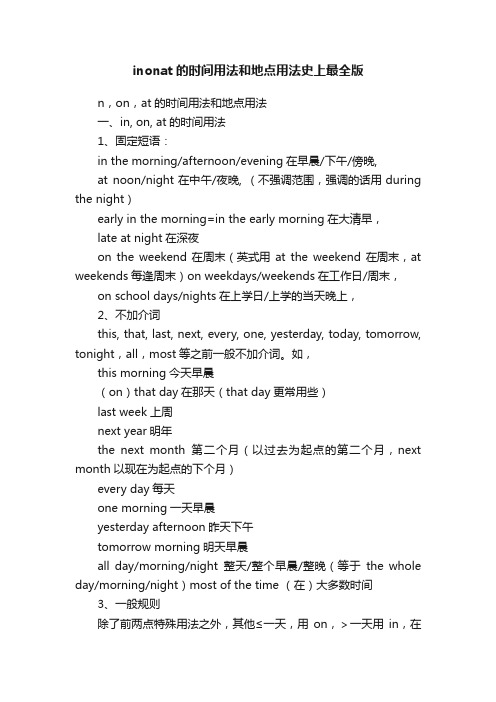
inonat的时间用法和地点用法史上最全版n,on,at的时间用法和地点用法一、in, on, at的时间用法1、固定短语:in the morning/afternoon/evening在早晨/下午/傍晚,at noon/night在中午/夜晚, (不强调范围,强调的话用during the night)early in the morning=in the early morning在大清早,late at night在深夜on the weekend在周末(英式用at the weekend在周末,at weekends每逢周末)on weekdays/weekends在工作日/周末,on school days/nights在上学日/上学的当天晚上,2、不加介词this, that, last, next, every, one, yesterday, today, tomorrow, tonight,all,most等之前一般不加介词。
如,this morning今天早晨(on)that day在那天(that day更常用些)last week上周next year明年the next month第二个月(以过去为起点的第二个月,next month以现在为起点的下个月)every day每天one morning一天早晨yesterday afternoon昨天下午tomorrow morning明天早晨all day/morning/night整天/整个早晨/整晚(等于the whole day/morning/night)most of the time (在)大多数时间3、一般规则除了前两点特殊用法之外,其他≤一天,用on,>一天用in,在具体时刻或在某时用at(不强调时间范围)关于onOn指时间表示:1)具体的时日和一个特定的时间,如某日,某节日,星期几等。
He will come to meet us on our arrival.On May 4th (On Sunday, On New Year’s day, On Christmas Day), there will be a celebration.2) 在某个特定的早晨,下午或晚上。
inonat的时间用法和地点用法完全版

in,on,at的时间用法和地点用法一、in, on, at的时间用法in the morning/afternoon/evening在早晨/下午/傍晚,at noon/night在中午/夜晚, (不强调范围,强调的话用during the night)early in the morning=in the early morning在大清早,late at night在深夜on the weekend在周末(英式用at the weekend在周末, at weekends每逢周末)on weekdays/weekends在工作日/周末,on school days/nights在上学日/上学的当天晚上,this, that, last, next, every, one, yesterday, today, tomorrow, tonight,all,most等之前一般不加介词。
如,this morning 今天早晨(on)that day在那天(that day更常用些)last week上周next year明年the next month第二个月(以过去为起点的第二个月,next month以现在为起点的下个月)every day每天one morning一天早晨yesterday afternoon昨天下午tomorrow morning明天早晨all day/morning/night整天/整个早晨/整晚(等于the whole day/morning/night)most of the time (在)大多数时间除了前两点特殊用法之外,其他≤一天,用on,>一天用in,在具体时刻或在某时用at (不强调时间范围)关于on生日、on my ninth birthday在我九岁生日那天节日、on Teachers’Day在教师节(注意:节日里有表人的词汇先复数再加s’所有格,如on Children’s Day, on Women’s Day, on Teachers’ Day有四个节日强调单数之意思,on Mother’s Day, on Father’s Day, on April Fool’s Day, on Valentine’s Day)星期、on Sunday在周日,on Sunday morning在周日早晨on the last Friday of each month 在每个月的最后一个星期五日期、on June 2nd在六月二日on the second (of June 2nd) 在六月的第二天即在六月二日on the morning of June 2nd在六月二日的早晨,on a rainy morning在一个多雨的早晨on a certain day 在某天on the second day在第二天(以过去某天为参照)注意:on Sunday在周日,on Sundays每逢周日(用复数表每逢之意),every Sunday每个周日,基本一个意思。
in_on_at的用法口诀小学

in on at的用法口诀小学在英语学习中,常常会遇到三个小词in、on、at的用法。
这三个小词的使用很常见,但是却容易让学习者困惑。
为了帮助大家更好地掌握这三个介词的用法,下面给大家分享一个口诀,希望对大家有所帮助。
首先,我们来看看in的用法。
in表示“在……里面”、“在……之内”,常用来表示地点、国家、城市、建筑物等。
例如:in the room(在房间里)、in China(在中国)、in London(在伦敦)。
另外,in还可以表示在某个时间段内,例如:in the morning(在早上)、in July(在七月)。
接着,是on的用法。
on表示“在……上面”、“在……之上”,通常用来表示具体的日期、天、路线等。
比如:on the table(在桌子上)、on Monday(在星期一)、on the street(在街上)。
另外,on还可以用来表示具体的某一天,例如:on Christmas(在圣诞节那一天)。
最后是at的用法。
at表示“在……处”、“在……附近”,常用来表示具体的地点或事件。
例如:at the school(在学校)、at the party(在派对上)、at the airport(在机场)。
同时,at还可以表示具体的时间点,例如:at 3 o’clock(在三点钟)。
通过这样一个简单的口诀,我们可以更容易地记忆和区分in、on、at这三个介词的用法。
记住,在英语学习中,掌握好这些基础用法非常重要,希望大家能够通过不断的练习和积累,将这些知识牢牢记住,为自己的英语学习打下坚实的基础。
希望以上内容对大家有所帮助,祝大家学习进步,英语越来越好!1。
inonat的具体用法

in, on, at的具体用法一 . in,on 在方位名词前的区别1.in 表示 A 地在 B 地范围之内。
如: Taiwan is in the southeast of China.2.on 表示 A 地与 B 地接壤、毗邻。
如: North Korea is on the east of China.二. at, in, on 在表示时间上的区别1.at 指时间表示:(1)时间的一点、时刻等。
如: They came home at sunrise.(at noon, at midnight, at ten o’clock, at daybreak, at dawn)(2)较短暂的一段时间。
可指某个节日或被认为是一年中标志大事的日子。
如: He went home at Christmas(at New Year, at the Spring Festival, at night) .2.in 指时间表示:(1)在某个较长的时间(如世纪、朝代、年、月、季节以及泛指的上午、下午或傍晚等)内。
如: in 2004, in March, in spring, in the morning, in the evening, etc.(2)在一段时间之后。
一般情况下,用于将来时,谓语动词为瞬间动词,意为“在⋯⋯以后”。
如: He will arrive in two hours.谓语动词为延续性动词时,in 意为“在⋯⋯以内”。
如:These products will be produced in a month.注意: after 用于将来时间也指一段时间之后,但其后的时间是“一点” ,而不是“一段”。
如: He will arrive after two o’clock.3.on 指时间表示:(1)具体的时日和一个特定的时间,如某日、某节日、星期几等。
如: On Christmas Day(On May 4th) , there will be a celebration.(2)在某个特定的早晨、下午或晚上。
Inonat用法与练习
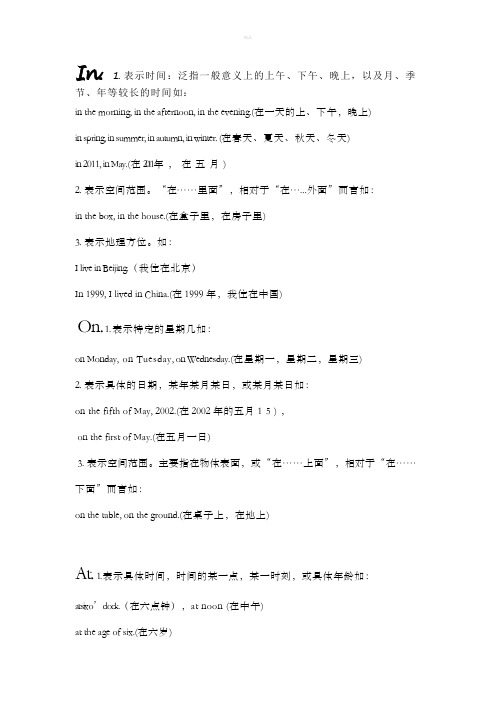
In. 1.表示时间:泛指一般意义上的上午、下午、晚上,以及月、季节、年等较长的时间如:in the morning, in the afternoon, in the evening.(在一天的上、下午,晚上)in spring, in summer, in autumn, in winter. (在春天、夏天、秋天、冬天)in 2011, in May.(在2011年,在五月)2. 表示空间范围。
“在……里面”,相对于“在…...外面”而言如:in the box, in the house.(在盒子里,在房子里)3. 表示地理方位。
如:I live in Beijing.(我住在北京)In 1999, I lived in China.(在1999年,我住在中国)On. 1. 表示特定的星期几如:on Monday, on Tuesday, on Wednesday.(在星期一,星期二,星期三)2. 表示具体的日期,某年某月某日,或某月某日如:on the fifth of May, 2002.(在2002年的五月15),on the first of May.(在五月一日)3. 表示空间范围。
主要指在物体表面,或“在……上面”,相对于“在……下面”而言如:on the table, on the ground.(在桌子上,在地上)At. 1. 表示具体时间,时间的某一点,某一时刻,或具体年龄如:a t si x o’clock.(在六点钟),at noon (在中午)at the age of six.(在六岁)2. 表示某一点位置如:at school, at home (在学校,在家)3. 与名词所有格连用表示地点如:at my sister’s (在我姐姐那里),at the doctor’s (在医务室)4.在表示位置的时候,in与a t的区别:in多用于较大的地方,如国家、地区、城市等a t多用于相对较小的地方,如某地方的学校、车站等in Shanghai, at the station.历年真题1.We wen to the country _a very cold morning.A.atB.inC.onD.of2.China lies ___ the east of Asia and _ the north of Australia.A.to; toB.in; toC.to; inD.in; on3.If you are able to get the tickets tomorrow, please tellme _phone.A.atB.byC.onD.through4.Lyon wanted to be a soldier and his dream cametrue _November 25th, 2008.A.inB.duringC.onD.at5.My father usually comes back from work _____ 6:30 ____the morning.A.in;onB.in;atC.on;inD.at;in6.This kind of machine was widely used_the 1960s.A.inB.forC.atD.on7.I’ve never seen such a scary film _ my life.A.byB.atC.onD.in。
inonat地点用法

In on at 地点用法1、At 表示地点(1) 指较小的地方。
如:I'll wait for you at the station.我将在车站等你。
(2) 用于门牌号码前。
如:He lives at 115 Fuzhou Road.他住在福州路115号。
2、In 表示地点(1)指较大的地方。
如:He lives in Shanghai。
他住在上海。
(2)说话人身在其中,也可以用in 表示较小的地方。
如:I'm now working in the post-office. 我现在在邮局工作。
3、On表示地点(1)在……上,一般指与面或线接触。
如:The picture was hanging on the wall. 画挂在墙上。
He put the book on the table and sat on the chair.他把书放在桌子上,人坐在椅子上。
(2)在……旁边。
如:He lives in a house on the river.他住在河边的房子里。
(3)在……(里)。
如:He lives on Fifth Avenue。
他住在第五大街。
I am a football member on the school team.我是学校足球队的一名成员。
介词at, in, on, by 表示地方、地点、位置的用法辨析一、小处at , at 把地方、地点、位置当作一个“点〞:二、 1. The begger is sitting at the corner. 那乞丐坐在角落里。
三、 2. Jane is waiting for you at the bus stop. Jane在巴士站等你。
at the market, 在市场at the station在车站在(post office 邮局)at the bookshop在书店 ( hotel宾馆, grocer' s 食品店,杂货店) , at t Mr. Brown's在布朗家 (my uncle's ) at Cambridge在剑桥at Peking University 在北京大学3. at home 在家4. Who's standing there at the door? 谁站在门口?/at the window5. at the top of the page 在一页的上面 at the bottom(front ,back ) of6. The shop is at the end of the road. 那商店就在路的尾端。
oninat地点的用法口诀
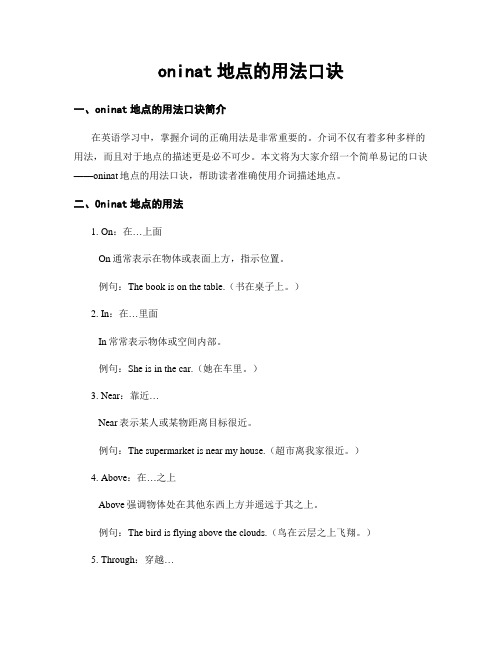
oninat地点的用法口诀一、oninat地点的用法口诀简介在英语学习中,掌握介词的正确用法是非常重要的。
介词不仅有着多种多样的用法,而且对于地点的描述更是必不可少。
本文将为大家介绍一个简单易记的口诀——oninat地点的用法口诀,帮助读者准确使用介词描述地点。
二、Oninat地点的用法1. On:在…上面On通常表示在物体或表面上方,指示位置。
例句:The book is on the table.(书在桌子上。
)2. In:在…里面In常常表示物体或空间内部。
例句:She is in the car.(她在车里。
)3. Near:靠近…Near表示某人或某物距离目标很近。
例句:The supermarket is near my house.(超市离我家很近。
)4. Above:在…之上Above强调物体处在其他东西上方并遥远于其之上。
例句:The bird is flying above the clouds.(鸟在云层之上飞翔。
)5. Through:穿越…Through表示通过障碍物或进入某个空间。
例句:He walked through the forest to get to the lake.(他穿过森林去湖边。
)6. Beside:在旁边、靠近…Beside指的是在某人或某物的旁边。
例句:My sister is sitting beside me.(我的姐姐坐在我旁边。
)7. Under:在…下面Under表示物体处于其他东西之下。
例句:The cat is sleeping under the table.(猫儿睡在桌子底下。
)8. Around:在…周围Around表示位置环绕某人或某物。
例句:Children are playing around the tree.(孩子们在树周围玩耍。
)9. Toward(s):朝向…Toward(s)用于描述方向,表示向着目标移动或朝向目标发展。
inonat的用法及区别口诀
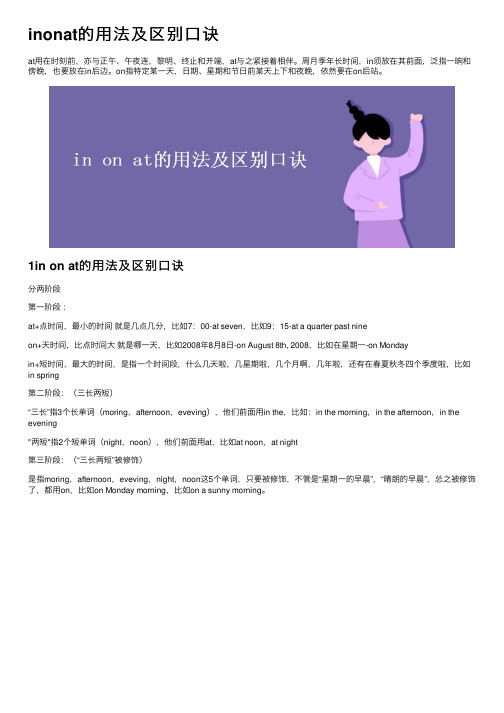
inonat的⽤法及区别⼝诀
at⽤在时刻前,亦与正午、午夜连,黎明、终⽌和开端,at与之紧接着相伴。
周⽉季年长时间,in须放在其前⾯,泛指⼀晌和傍晚,也要放在in后边。
on指特定某⼀天,⽇期、星期和节⽇前某天上下和夜晚,依然要在on后站。
1in on at的⽤法及区别⼝诀
分两阶段
第⼀阶段:
at+点时间,最⼩的时间就是⼏点⼏分,⽐如7:00-at seven,⽐如9:15-at a quarter past nine
on+天时间,⽐点时间⼤就是哪⼀天,⽐如2008年8⽉8⽇-on August 8th, 2008,⽐如在星期⼀-on Monday
in+短时间,最⼤的时间,是指⼀个时间段,什么⼏天啦,⼏星期啦,⼏个⽉啊,⼏年啦,还有在春夏秋冬四个季度啦,⽐如in spring
第⼆阶段:(三长两短)
“三长”指3个长单词(moring,afternoon,eveving),他们前⾯⽤in the,⽐如:in the morning,in the afternoon,in the evening
"两短"指2个短单词(night,noon),他们前⾯⽤at,⽐如at noon,at night
第三阶段:(“三长两短”被修饰)
是指moring,afternoon,eveving,night,noon这5个单词,只要被修饰,不管是“星期⼀的早晨”,“晴朗的早晨”,总之被修饰了,都⽤on,⽐如on Monday morning,⽐如on a sunny morning。
介词in,on和at的用法和词组

介词in, on 和at的用法和词组以下是小编为大家整理的介词in,on,at的相关词组的用法总结,希望能帮助大家更好地认识in,on,at这些介词,提高英语水平。
介词in, on 和at表示时间,地点和状态的常用短语在英语中介词的使用频率比较高,而介词in, on和at 又是介词中使用频率比较高的词,笔者收集了介词in, on 和at表示时间,地点和状态的常见的短语, 请注意一些短语用不同的介词,意义不同,有些区别不大。
时间timeinin 1999, in 20 century, in a flash(瞬时), in a lucky hour(在幸运时刻), in a minute, in a second, in a short time, in a while, in a wink(一瞬间) in advance(预先), in an emergency(在紧急地时候), in an evil hour(在不幸地时刻), in an instant, in ancient times, in broad day(在大白天), in course of, (在…期间), in December, in due course(及时地), in future, in good season(及时地), in no time(马上), in one''s childhood, in one''s spare time, in one''s teens, in one''s youth, in recent years, in season(适时), in seconds(在很短的时间), in some cases(有时候), in spring, in the afternoon, in the beginning, in the daytime, in the end, in the evening, in the future, in the long run(最后), in the meantime, in the morning, in the nick of time(在紧急关头), in the night, in the past, in the thick of (在最激烈的时刻), in the thick of(在最激烈的时刻), in this period, in those days, in time of war, in time,onon a certain day, on a sudden(突然), on a winter morning, on Christmas Day, on night shift, on one''s birthday, on schedule(按时), on Sunday, on that date, on the eve of, on the following day, on the instant(马上), on the moment(立刻), on the Mondaymorning, on the New Year''s Eve, on the next morning, on the point of(正在…时候), on the spur of the moment(立刻) on this day, on this occasion, on time,atat a time(在某时), at a wedding(婚礼), at all times(一直), at any moment, at any time, at Christmas, at dark (天黑时), at dawn(在黎明), at daybreak, at dinner-time, at dusk(在黄昏), at Easter, at first sight,(一见到), at first, at last, at midnight, at night, at nightfall, at noon, at present, at six clock, at sunrise, at sunset, at that moment, at that time, at the age of, at the beginning of , at the correct time, at the end of, at the last minute, at the moment, at the present stage at the same time, at the stage(眼下) at the start, at the time being, at the time of, at the very start, at this point(此时), at this season, at this time of day, at times(有时)状态stateinin progress(在进行中), in a dilemma(处于进退两难的境地), in a hurry, in a tight corner(处于困难中), in action(在行动中), in an emergency, (处于紧急情况中), in anxiety, in astonishment, in bad mood(心情不好), in bad temper(心情不好,生气), in bed, in blossom(bloom) (在开花 ), in bonds(在拘留中), in chains(在囚禁中), in charge(看管), in church, in class, in collision(在冲突中), in commission (在服役), in condition(健康情况良好), in confusion (在混乱中), in control (of), in court(出庭), in custody(拘留), in danger, in debt(负债), in deep water(s)(处于困境), in demand(有需求) in despair, in difficult, in dispute(在争论), in doubt, in employment, in exile(在流放), in fear and trembling(提心吊胆), in flight(飞行), in flood, in full blossom(开着花), in good condition, in good health, in high spirits, in horror, in hospital, in isolation. in love, in motion, in need (of) in operation(在运转), in order(状态良好), in panic, inpeace(平安)(at peace和平), in peril(处于危险), in place, in power, in practice(在实践中), in preparation, in process(在进行中), in production, in progress(前进,进行中), in pursuit(在追赶中), in question(正被讨论), in rehearsal(在彩排), in retirement(退休), in retreat(在撤退) in sail(张着帆) in secret, in service, in session(在会议中), in short supply, in silence, in sorrow, in stock(有库存) in store(储藏着) in succession, in surprise, in suspension(悬浮中) in tears(流着泪) in the field(在作战), in the press(在印刷), in the red(负债), in the same boat(处境相同), in the works(在计划中), in thought, in trade, in triumph, in trouble, in use, in view(被考虑), in wonder, in work(有工作), in work, in(at) college, in(at) school, in(at) university,onon a diet(在节食), on a picnic, on a trip, on a vacation trip, on a visit, on a voyage, on a walk, on approval, on bended knees(跪着) on business, on call (待命) on credit(赊帐), on display, on drill(在训练), on duty, on exhibition, on fire, on foot, on good terms(友好), on guard, on hire(出租) on holiday, on leave, on loan(出借), on offer(出售中), on one''s day(在最兴旺的日子), on one''s guard(警惕) on one''s honeymoon, on one''s knees, on one''s mind(惦念), on one''s own time(在非工作时间), on one''s round(出诊) on order(已订购), on parade(在游行), on patrol(巡逻) on sale(待售) on sale, on show, on stream(在生产中) on the air(在广播), on the alert(提防), on the ebb(在退潮), on the feed(在进食), on the fly(在飞行中), on the increase/decrease(在增长/下降中), on the job(工作着) on the listen(在注意听), on the lurk(暗中行动), on the march(行军中), on the move(在活动中) on the phone(在打电话) on the quiet(秘密地) on the rise(在上涨), on the run(跑这), on the spot(在危险中,当场), on the strike, on the turn(在转变中) on the watch(守侯着), on the way(在途中), on the way, on tour, on trial,on vacation, on view(展览着), on watch(值班),atat a disadvantage(处不利地位), at a lecture, at a run(跑着), at breakfast, at call(随叫随到), at church, at dinner, at ease(悠闲自得), at feed, at gaze, at grass, at graze,(在吃草) at hand(在手边), at high/low(处于高潮/低潮中), at issue(在争论中), at large(未被捕), at leisure (空闲着), at meals, at peace, at play, at rest, at school, at stake(处在危险中), at study, at table(在吃饭), at the bar(受到公开审问), at the meeting, at the piano, at the wheel(在驾车), at war, at work,地点placeinin a car, in a queue, in advance of (在…前面), in all the direction, in appearance, in corners(在角落里) in doors, in front (of), in good light(在光线好的地方), in heaven, in place(position)(在适当地位置), in places(处处), in port(在港内), in public places, in shore(靠岸), in society, in the air(在空中) in the bank, in the book(书的内容里), in the centre(在中央), in the countryside, in the distance(在远处那边), in the east of(在…东部) in the east, in the fields, in the film, in the front rank(在前列), in the front row, in the lab, in the letter(信的内容), in the middle of, in the moonlight, in the newspaper(报纸的内容里), in the open air(在户外), in the open(在野外), in the picture, in the rain, in the room, in the shade of, in the sky, in the suburbs of, in the sunshine, in the tree, in the universe, in the vicinity of(在附近), in the warm(在暖和的地方) in the world, in(on) the bus, in(on) the street, onon board (在船上) on camera(出现在电视上), on campus, on deck(在甲板上), on earth, on high(在高处), on land, on the bank, on the beach, on the borders, on the ceiling, on the coast, on thecommittee, on the corner(在拐角处), on the east of(在…的东面) on the farm, on the first floor, on the football field, on the (play)ground, on the horizon, on the island, on the left/right,. on the market, on the page 12, on the railway line, on the river, on the road, on the roof, on the sea, on the shore, on the side of, on the team, on the track(在轨道上), on the water(在水面上), on top of, on(in) the wall,atat a bookshop, at a distance(在远处), at that place, at the airport, at the back of, at the base of, at the bottom of, at the centre (of)(在中心), at the corner, at the crossroads, at the desk(在书桌旁), at the door, at the edge of, at the end of, at the foot of, at the front, at the gate, at the head of, at the meeting, at the mine(在矿山), at the party, at the place, at the pub, at the rear of, at the seaside, at the station, at the stop, at the top of, at the window, at(in) the cinema, at(in) the library, at(in) the office, at(in) the village, at(on) the weekend--------------------------------------------------------------------------------------介词in, on 和at的用法和词组相关文章推荐:常用介词的分类及用法介词的用法记忆口诀介词“to”的用法及词组介词及介词短语的英语常见用法。
小学英语inonat区别用法

inonat差别用法介是英用中的一大,波及面广且用法也灵巧,因此起来特别麻,下边我把一些用的介作了一个小,供以参照。
早、午、晚要用in,at拂晓、子夜、点与分。
年、月、年代、季、周,阳光、灯、影、衣、冒in。
未来in...此后,小at大in。
有形with无形by,言、位、资料in。
特点、方面与方式,心情成用in。
介at和to表方向,攻、地点、、善分。
日子、日期、年代日,礼拜加上早、午、晚,收音、、日on,对于、基、靠、著。
着、、销售、、公、假,成心、支付、相反,准。
特定日和“一⋯⋯就”,on后常接名。
年、月、日加早、午、晚,of以前on代in。
步行、、、玩笑on,cab,carriage用in。
at山脚、口、在目前,速、温、日落、价、核心。
如大概掌握上边介用法口,就不易出。
自然,至于介的尽用法,同形又是及副等内容此篇不。
下边口分例帮助你理解消化。
早、午、晚要用inintheevening在夜晚intheday在白日例:intheafternoon在下午inthemorning在清晨at拂晓、午、夜、点与分atdawnatdaybreak在拂晓候atnight在夜atnoon在正午atmidnight在子夜以上短都不用冠atnineo'clock在9点at8:30seventhirty在8点半athalfpastten在10点半atninefifteen在9点15分attenthirty. 在上午10点30分也能够写成seventofive5点差7分半小以上fiveminutesaftertwo2点过5分attheweekend在周末ataquartertotwo1点45分年、月、年代、季节、周即在“来年”,在“某月”,在“某年某月”但在某年某月某日则用on,在四时,在第几周等都要用in。
例:in1989在1989年in1927在1927年inMarch在三月inApril在四月inDecember1986在1986年12月inJulyl984在1984年7月inthefirstweekofthissemester这学期的第一周inthethirdweek在第三周inspring在春天insummer在夏季inautumn在秋天inwinter在冬季阳光、灯、影、衣、冒in即在阳光下,在灯下,在树阴下,穿衣、着装、冒雨等都要用in。
in on at 地点 用法
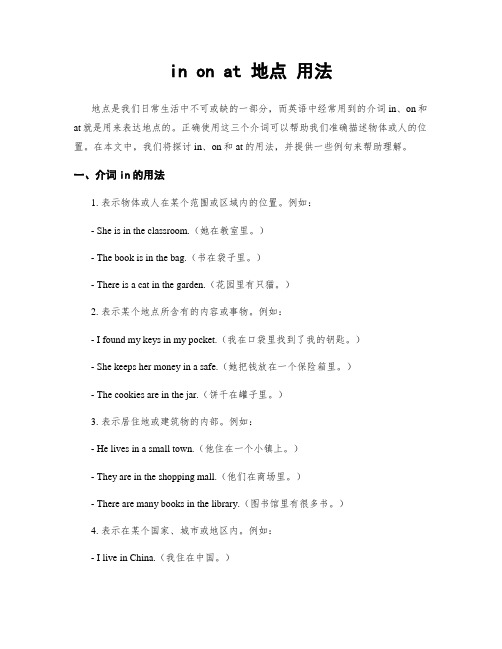
in on at 地点用法地点是我们日常生活中不可或缺的一部分,而英语中经常用到的介词in、on和at就是用来表达地点的。
正确使用这三个介词可以帮助我们准确描述物体或人的位置。
在本文中,我们将探讨in、on和at的用法,并提供一些例句来帮助理解。
一、介词in的用法1. 表示物体或人在某个范围或区域内的位置。
例如:- She is in the classroom.(她在教室里。
)- The book is in the bag.(书在袋子里。
)- There is a cat in the garden.(花园里有只猫。
)2. 表示某个地点所含有的内容或事物。
例如:- I found my keys in my pocket.(我在口袋里找到了我的钥匙。
)- She keeps her money in a safe.(她把钱放在一个保险箱里。
)- The cookies are in the jar.(饼干在罐子里。
)3. 表示居住地或建筑物的内部。
例如:- He lives in a small town.(他住在一个小镇上。
)- They are in the shopping mall.(他们在商场里。
)- There are many books in the library.(图书馆里有很多书。
)4. 表示在某个国家、城市或地区内。
例如:- I live in China.(我住在中国。
)- He is in New York.(他在纽约。
)- They are in the countryside.(他们在乡下。
)5. 表示某个时刻或时间段内。
例如:- We usually have lunch in the afternoon.(我们通常在下午吃午饭。
)- The concert will start in an hour.(音乐会将在一个小时后开始。
)- They will arrive in a few minutes.(他们将在几分钟内到达。
介词in,on,at的用法总结及例句
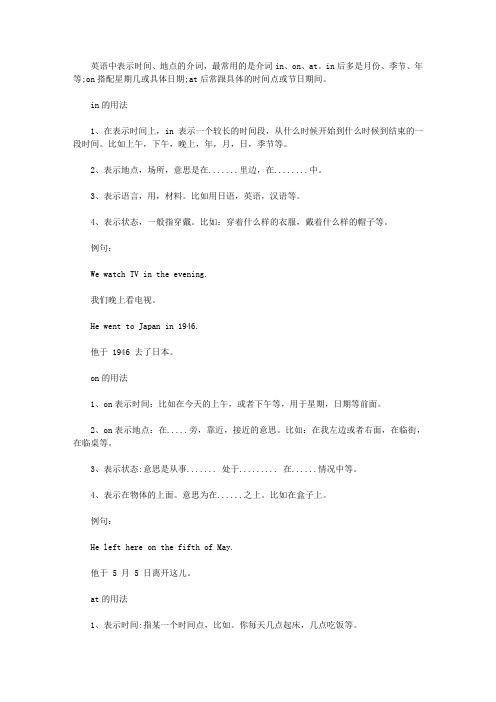
英语中表示时间、地点的介词,最常用的是介词in、on、at。
in后多是月份、季节、年等;on搭配星期几或具体日期;at后常跟具体的时间点或节日期间。
in的用法1、在表示时间上,in表示一个较长的时间段,从什么时候开始到什么时候到结束的一段时间。
比如上午,下午,晚上,年,月,日,季节等。
2、表示地点,场所,意思是在.......里边,在........中。
3、表示语言,用,材料。
比如用日语,英语,汉语等。
4、表示状态,一般指穿戴。
比如:穿着什么样的衣服,戴着什么样的帽子等。
例句:We watch TV in the evening.我们晚上看电视。
He went to Japan in 1946.他于 1946 去了日本。
on的用法1、on表示时间:比如在今天的上午,或者下午等,用于星期,日期等前面。
2、on表示地点:在.....旁,靠近,接近的意思。
比如:在我左边或者右面,在临街,在临桌等。
3、表示状态:意思是从事....... 处于......... 在......情况中等。
4、表示在物体的上面。
意思为在......之上。
比如在盒子上。
例句:He left here on the fifth of May.他于 5 月 5 日离开这儿。
at的用法1、表示时间:指某一个时间点,比如。
你每天几点起床,几点吃饭等。
2、在某个特定的时间,时机,时候,季节等用at.3、在........岁。
也用at.比如,在我8岁的时候,10岁的时候等4、在.......方面。
用at。
比如。
在工作方面,生活方面等。
例句:I get up at six in the morning.我早上六点钟起床。
He got married at the age of 25.他 25 岁结婚。
小学英语介词at,in,on等的用法
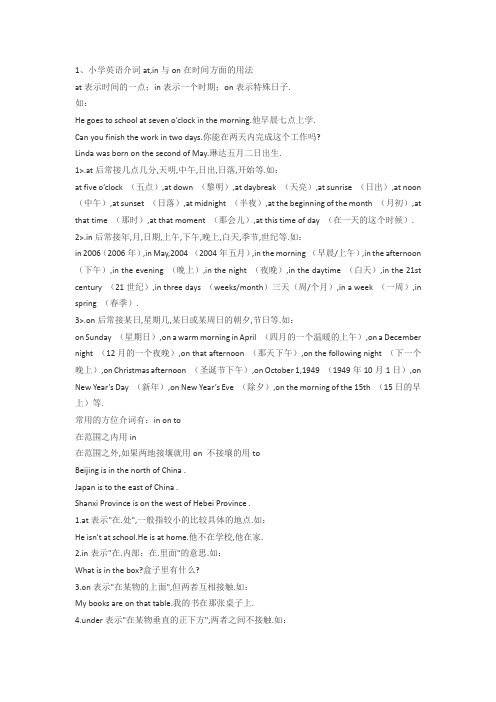
1、小学英语介词at,in与on在时间方面的用法at表示时间的一点;in表示一个时期;on表示特殊日子.如:He goes to school at seven o’clock in the morning.他早晨七点上学.Can you finish the work in two days.你能在两天内完成这个工作吗?Linda was born on the second of May.琳达五月二日出生.1>.at后常接几点几分,天明,中午,日出,日落,开始等.如:at five o’clock (五点),at down (黎明),at daybreak (天亮),at sunrise (日出),at noon (中午),at sunset (日落),at midnight (半夜),at the beginning of the month (月初),at that time (那时),at that moment (那会儿),at this time of day (在一天的这个时候).2>.in后常接年,月,日期,上午,下午,晚上,白天,季节,世纪等.如:in 2006(2006年),in May,2004 (2004年五月),in the morning (早晨/上午),in the afternoon (下午),in the evening (晚上),in the night (夜晚),in the daytime (白天),in the 21st century (21世纪),in three days (weeks/month)三天(周/个月),in a week (一周),in spring (春季).3>.on后常接某日,星期几,某日或某周日的朝夕,节日等.如:on Sunday (星期日),on a warm morning in April (四月的一个温暖的上午),on a December night (12月的一个夜晚),on that afternoon (那天下午),on the following night (下一个晚上),on Christmas afternoon (圣诞节下午),on October 1,1949 (1949年10月1日),on New Year’s Day (新年),on New Year’s Eve (除夕),on the morning of the 15th (15日的早上)等.常用的方位介词有:in on to在范围之内用in在范围之外,如果两地接壤就用on 不接壤的用toBeijing is in the north of China .Japan is to the east of China .Shanxi Province is on the west of Hebei Province .1.at表示"在.处",一般指较小的比较具体的地点.如:He isn't at school.He is at home.他不在学校,他在家.2.in表示"在.内部;在.里面"的意思.如:What is in the box?盒子里有什么?3.on表示"在某物的上面",但两者互相接触.如:My books are on that table.我的书在那张桌子上.4.under表示"在某物垂直的正下方",两者之间不接触.如:My cat is under my chair.我的猫在我的椅子下.5.behind表示"在某物体的后面".如:The broom is behind the door.笤帚在门后.6.in front of表示"在.的前面",正好与behind相反.如:There are some big trees in front of our classroom.我们教室前面有几棵大树.7.near表示"在某物体的附近",意为"接近、靠近".如:The ball is near the door.球在门旁边.介词in,on,under,behind是表示静态位置的介词介词用法口诀早、午、晚要用in,at黎明、午夜、点与分.年、月、年月、季节、周,阳光、灯、影、衣、冒in.将来时态in...以后,小处at大处in.有形with无形by,语言、单位、材料in.特征、方面与方式,心情成语惯用in.介词at和to表方向,攻击、位置、恶、善分.日子、日期、年月日,星期加上早、午、晚,收音、农场、值日on,关于、基础、靠、著论.着、罢、出售、偷、公、假,故意、支付、相反,准.特定时日和"一……就",on后常接动名词.年、月、日加早、午、晚,of之前on代in.步行、驴、马、玩笑on,cab,carriage则用in.at山脚、门口、在当前,速、温、日落、价、核心.工具、和、同随with,具有、独立、就、原因.就……来说宾译主,对、有、方状、表细分.海、陆、空、车、偶、被by,单数、人类know to man.this、that、tomorrow,yesterday,next、last、one.接年、月、季、星期、周,介词省略已习惯.over、under正上下,above、below则不然,若与数量词连用,混合使用亦无关.'beyond超出、无、不能,against靠着,对与反.besides,except分内外,among之内along沿.同类比较except,加for异类记心间.原状because of,、owing to、due to表语形容词under后接修、建中,of、from物、化分.before、after表一点,ago、later表一段.before能接完成时,ago过去极有限.since以来during间,since时态多变换.与之相比beside,除了last but one.复不定for、找、价、原,对、给、段、去、为、作、赞.快到、对、向towards,工、学、军、城、北、上、南. but for否定用虚拟,复合介词待后言.ing型由于鉴,除了除外与包合.之后、关于、在.方面,有关介词须记全.in内to外表位置,山、水、国界to在前.。
in on at的用法及区别

in on at的用法及区别一、介词in、on和at的基本用法在学习英语的过程中,常会遇到一些基础的介词,如in、on和at。
这三个介词都有各自特定的用法和含义,在句子中发挥着重要的作用。
下面我们将逐一探讨它们的用法及区别。
二、in的用法及区别1. 表示位置、地方或地点:例如:He is in the classroom.(他在教室里。
)注意:在使用"in"表示位置时,需注意其后可能跟随名词单数形式。
2. 表示年份、季节或月份:例如:She was born in 1990.(她出生于1990年。
)We often go hiking in spring.(我们经常在春天去徒步旅行。
)The party will be held in December.(派对将于12月举行。
)3. 表示时间段:例如:He finishes his work in two hours.(他两小时内完成了工作。
)4. 表示状态或处境:例如:She is in trouble now.(她现在有麻烦了。
)5. 表示某一领域或事物之内:例如:I am interested in music. (我对音乐感兴趣。
)6. 在某种条件下:例如:In case of emergency, please contact this number immediately.(如果有紧急情况,请立即联系这个号码。
)三、on的用法及区别1. 表示表面位置:例如:The book is on the table.(书在桌子上。
)2. 表示日期或确切时间:例如:We will have a meeting on Monday.(我们将在星期一开会。
) The flight departs on time.(航班准点起飞。
)3. 表示电视、广播或舞台节目:例如:She always watches the news on TV.(她经常看电视新闻。
in at on的用法

in at on的用法in,at,on英语中最常用的介词,但他们的意义及用法却是非常复杂的。
正确的理解和使用这三个介词,对英语的学习是十分重要的。
in 一般用来表示在某种范围或状态中,表示地点时,通常指特定建筑物或区域内。
在书面语中,in常用来表达时间;在口头语中,则表达状态。
At来表达地点,一般用来表示特定的地点,比如门、街道、建筑物外部。
At可以用来表示时间,比如at nine oclock等。
At 也可以表达某种活动,比如 at school或 at the meeting等。
On示地点时,一般用来表示地面上的具体位置,比如on the table、on the wall等。
On可以表示时间,比如on Sunday、on Monday 等以及表达日期、日历,比如on June 4th 、on December 25th等。
in, at on可以表达时间,但有一定的规则。
在表达一般日常活动时,一般使用 on;但在表达日期,星期,或某一般性的时间段时,一般使用 in;当表达具体的时间时,一般使用 at。
例如:I have an appointment at 3 oclock.3点有点约会。
I had an appointment on Monday.周一有个约会。
I will have an appointment in April.四月份有个约会。
in, at on可以表示地点,但也有一定的规则,有时可以互换,有时又不能互换。
例如:I live in China.住在中国。
I live at home.住在家里。
I live on the third floor.住在三楼。
但是I work at Beijing.在北京工作。
I work in Beijing.在北京工作。
此外,in, at on可以用来表示某个状态,如:He is in the army. 他在军队里。
He is at home. 他在家里。
- 1、下载文档前请自行甄别文档内容的完整性,平台不提供额外的编辑、内容补充、找答案等附加服务。
- 2、"仅部分预览"的文档,不可在线预览部分如存在完整性等问题,可反馈申请退款(可完整预览的文档不适用该条件!)。
- 3、如文档侵犯您的权益,请联系客服反馈,我们会尽快为您处理(人工客服工作时间:9:00-18:30)。
介词in on at 用法复习练习
一种虚词。
不能单独作句子成分,它只有跟它后面的宾语一起构成介词短语,才能在句子中起作用。
有:in, on, under, with, behind, about, near, before, after, for, to, up, down, from, in front of, out of, from…to…, at the back of…
一、in 的用法
1.表示位置,"在……里(中)"。
如:
in the pencil-box在铅笔盒里,in the room在房间里
2. 表示一段时间,"在某年、某月、某季节"、"在上午(下午、傍晚)"。
如:
in March在三月,in spring在春季,in the morning在早上(上午)
3. 表示表达方式,"用某种语言"。
如:in English用英语,in Chinese用汉语
4. 表示序列,"在某班、年级、排"。
如:
in Class Two在二班,in Class One,Grade Six在六年一班
5.表示服饰,"穿(戴)"。
如: a girl in red穿红衣服的女孩
6. 表示"在家"。
如:
-Is your father in? 你父亲在家吗?-Yes, he is. 是的,他在家。
二、on的用法
1.表示位置,"在……上面"(与物体表面接触)。
如:
on the desk在课桌上,on the wall在墙上
2. 表示时间,"在某一天,在某一天的上午(下午、晚上)"。
如:
on Sunday在星期天,on Monday morning在星期一早上(上午)
三、at的用法
1.表示具体的地点。
如:at the hotel在旅馆,at school在学校
2.表示具体的时刻,"在几点几分"。
如:
at six o’clock在六点钟,at eight fifteen在八点十五分(在八点一刻)
3. at还可表示在节日或休假时间。
如:
at Christmas在圣诞节,at the weekend在周末
另外,at常用于固定短语中。
如:at night在夜间,at noon 在正午
练一练:选用括号内恰当的介词填空。
1) What’s this ( at, on, in ) English?
2) Christmas is ( at, on, in ) the 25th of December.
3) The man ( with, on, in ) black is Su Hai’s father.
4) He doesn’t d o well ( at, on, in ) PE.
5) Look at those birds ( on, in ) the tree.
6) We are going to meet ( at, on, in ) the bus stop ( at, on, in ) half past ten.
7) Is there a cat ( under, behind, in ) the door?
8) Helen’s writing paper is ( in, in front of ) **pute r.。
